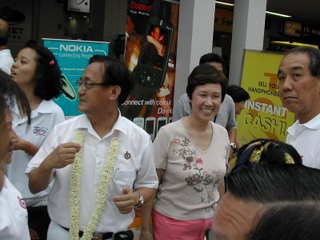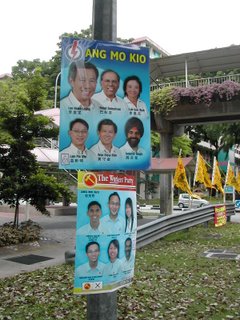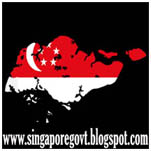Two Oppositions, Two Differing Paths: Part I
Story of the Workers’ Party and Singapore Democratic Party
I’ve always received comments and criticisms for being too much of a mouth-piece of the PAP.

Hopefully, this article on the Opposition parties can slant me back to the neutral centre. With the conclusion of the recent General Elections, it is fair to say that Workers’ Party seemed to have more potential to challenge the PAP compared to the rest. This article features the birth, progress and path of the party.
The Workers’ Party (WP)The WP, formed in 1957, is the longest-surviving opposition party in Singapore. In its relatively long period, the WP has been led by tough-talking personalities who will be remembered for their roles in the political development of this country. One thing is sure when the WP is contesting: they never lack colourful politicians, such as David Marshall, Dr Lee Siew Choh, J.B. Jeyaratnam, Tang Liang Hong and, the current favourite, James Gomez, to spark the local politics. The WP can be seen in three eras: David Marshall (1957 to 1970), J.B. Jeyaratnam (1971 to 2000) and Low Thia Khiang (2001 to present)
Under “Marshall Law”Many would remember David Marshall as the first Chief Minister; the man who failed
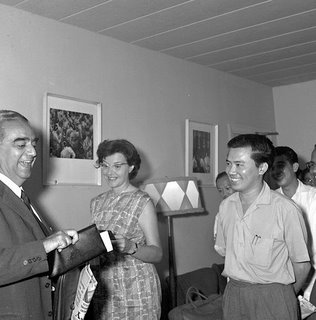
in gaining Singapore’s independence from the British but seldom the man who founded the Workers’ Party. Lim Yew Hock, the authoritarian second Chief Minister of Singapore, was his then-deputy in the Labour Front government. Lim advised Marshall that his should establish a party as a political base to mobilize the people towards independence. The new party would later prove useful to him when he vacated the post of Chief Minister.
Marshall was quick to see his party playing a moderate, alternative role to both the left-wing PAP (under the far leftist Lim Chin Siong) and the right-wing Labour Front Government of Lim Yew Hock (who liberally used political detention to maintain his power – sounds familiar? ;) ).

Marshall openly clashed with Lim on the manner of dealing with the leftists and communists – political detention. Having felt that the Trades Union Congress being a puppet of Lim Yew Hock, Marshall reiterated his view that his new party will be guided by his desire to see the trade unions flourish in a more independent role vis-à-vis the government. This special inclination towards the trade unions not only reflected in the party name, Workers’ Party, but also in the party constitution. During then (now amended), the Constitution states that of the 30 Council members elected “at least two-thirds shall be trade unionists”.
As a political party, it was not doing that well. Marshall knew that the strength of his new party was dependent on the support of the pro-Communist trade union members. In the Battle for Merger, Lee Kuan Yew charged the party of being manipulated by Fang Chuang Pi (the “Plen”) – the Communists from MCP. Chang Yuen Tong, Executive Committee member of the WP resigned when LKY showed the evidence.

In the 1958 by-elections, due to the Plen’s undertaking to LKY, pro-communist votes were swung away from the WP, resulting in humiliating defeat for Marshall. Marshall regained his parliamentary seat in 1961 – at a time when all political parties were hotly debating the issue of merger with the Malayan Federation. His main argument was to object to the PAP’s idea of Malaysia, charging the latter’s vision as “selling out” of Singapore’s interests. Marshall instead called for complete merger, with Singapore seeking equal rights for its citizens in the new federation. He further maintained that if Singapore could not negotiate for a complete merger, she should seek independence on her own. Within his own party, there were differing views between him, Secretary-General Sum Chong Heng and Chua Chin Kiat. In the end, a compromise was reached on the party position, but the uneasiness never ended.
In the 1963 General Elections, things got worse for Marshall. Not only did he lose his seat, he even lost his election deposit. Dejected, he went into political oblivion and decided to concentrate on his legal career and was later appointed as the Singapore’s Ambassador to France.
The Fire of J.B. JeyaratnamAfter Marshall’s resignation, JBJ took over. Within three days, JBJ was the

Secretary-General of the Workers’ Party. The infusion of new professionals, such as lawyers, architects and unionists, boosted the party’s image to an extent that the party was confident enough to declare that they are contest in all the seats in the 1972 GE (but in the end, they didn’t contest in all seats, 8 seats returned to the PAP uncontested). JBJ had quite a credible background after serving in key appointments such as Registrar of the Supreme Court and as the First District Judge. But despite JBJ’s background and infusion of professionals in the WP, the PAP won all 65 seats with an average of 69.2% of the votes. JBJ contested in Farrer Park constituency but lost badly to the PAP, Dr Lee Chiaw Meng, gaining only 2,668 out of 12,707 votes.
The 1976 elections was no difference when the PAP won all 69 seats, the third successive clean sweep. JBJ, whose election rally at the car park in Chai Chee on the eve of voting was “packed like sardines”, performed well with 40.08% of the votes. He was the highest-scoring opposition candidate in the election.
The turning point for the WP and JBJ came in October 1981, with the resignation of the incumbent Anson MP, Devan Nair (who was appointed as the President). JBJ defeated the PAP’s Pang Kim Hin by 633 votes to break the PAP’s electoral infallibility.

However, one must note that several events leading to the Anson by-election led to the PAP losing that seat. When Devan Nair left Anson to become Singapore’s third President, many of his followers were unhappy with Pang as he brought his own men into the election campaign. One prominent person belonging to the Devan Nair camp was Ong Ah Heng, branch secretary to Anson and now a present Member of Parliament. Pang, was a political lightweight, which Anson residents were unhappy that PAP sent him there instead of other prominent candidates. Whatever the events, JBJ won and PAP received a rude wakeup call.

The next election in 1984 was a bolt from the blue as the PAP saw their percentage votes dropped from 75.7% in 1980 to 62.9% in 1984. To add salt on the PAP wounds, Chiam See Tong from the Singapore Democratic Party defeated Mah Bow Tan (PAP) with a thumping 60.28% of the votes. Chiam and JBJ were the only two oppositions elected into the parliament that year.
JBJ’s time in parliament was short-lived when he was disqualified from parliament when the court found him guilty for false declaration of the WP’s accounts. By such sentence, he lost his seat in Anson. On 23 May 1987, 16 people were detained under the Internal Security Act charged for involvement in a plot to overthrow the Government, in what came to be widely known as the “
Marxist conspiracy”. The ISD also arrested Patrick Seong, a lawyer who was counsel for some of the detainees. He subsequently admitted that he had encouraged them to issue the statement as a means of discrediting the government that a former Law Society president, Francis Seow, knew about it.
Seow was also later picked up and only released in July 1988 after serving his jail sentence.
In the 1988 GE, WP successfully recruited Francis Seow, a former Solicitor-General, and WP competed in 32 of the 81 seats. The public and media attention was on Seow, especially when he managed to attract large crowds to rallies. Mugslinging was at his peak when Seow called Goh Chok Tong a “political eunuch in Emperor Lee’s court”. When the results came, PAP won all the seats except Potong Pasir. However, Seow did the damage in Eunos GRC, where he contested together with seasoned politician Dr Lee Siew Choh and Mohd Khalit, garnering 49.11% of the valid votes. Both Dr Lee and Seow were offered NCMP seats but Seow was disqualified – being sued by the Government for various wrongdoings, including tax evasions. That was the beginning of his smear campaign against the government which later sees him migrating to United States. He has not returned to Singapore since then and had published a book in 1994, “To Catch a Tartar” Life in Lee Kuan Yew’s Prison,” alleging that he was tortured during detention.

For the Workers’ Party itself, throughout 1990, and through its newsletter, the Hammer, the party continued to raise many issues and criticisms against the Government. Then came the snap 1991 General Elections, called upon by the new Prime Minister Goh Chok Tong, barely three-and-a-half years after the previous one in 1988. The opposition camp was obviously caught off guard by the sudden announcement. However, it also caught the PAP MPs off guard and the tactic backfired. This time around, the focus was again in Eunos GRC with Jufrie Mahmood, a Workers’ Party team member leading the charge. He attacked the PAP’s Malay MPs as “a bunch of yes men” and charged the PM for resorting yet again to what it described as “scare and smear tactics” to discredit its candidates and the WP. The PAP won 77 seats but were visibly shocked to lose four seats (to Chiam See Tong (SDP), Ling How Doong (SDP), Cheo Chai Chen (SDP) and Low Thia Khiang (WP)). The WP team in Eunos GRC performed strongly when it secured 47.6% of the votes against the PAP team.
In 1997 General Elections, the Worker’s Party sprung yet another surprise and gave the PAP one of the toughest fights.

It fielded a well known Chinese lawyer, Tang Liang Hong, active in the Nanyang Academy of Fine Arts and a former Chairman of the Chinese High School. And the battleground was set at Cheng San GRC. According to JBJ in his book, The Hatchet Man of Singapore, he said, “When I led the team into the nomination center along with Tang Liang Hong, the PAP team, led by Lee Yock Suan, who had already registered their candidacy with the registration officer, showed their shock and dismay plainly. They had not expected me in Cheng San. They believed that I was going Kampong Glam which was then a single constituency where I had done the rounds few days before Nomination Day. This was a deliberate ploy.”
Cheng San, the mountain of peace, erupted like a volcano through the campaign period of eight days (now it is nine days). Goh Chok Tong, Lee Kuan Yew, Lee Hsien Loong and Tony Tan took charge of the campaign in Cheng San, with Lee Yock Suan relegated to the sidelines. Goh Chok Tong told the electorate that it was a battle between him and the Workers’ Party. GCT gave this message,
“You decide. You choose Tang Liang Hong, Jeyeratnam, 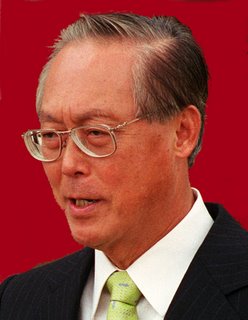 raise their status and lower the Prime Minister’s the Deputy Prime Ministers’ stature, in Singapore, internationally, that will have very serious consequences.”
raise their status and lower the Prime Minister’s the Deputy Prime Ministers’ stature, in Singapore, internationally, that will have very serious consequences.”
“What we are now doing is to… put all the chips on the table. It is a winner-takes-all situation. MRT, LRT, Punggol 21, upgrading, estate improvement, libraries, kindergartens, better schools… all these are plans which… have put to the people.”
“We win, Cheng San will get not just the attention of Lee Yock Suan and the team. Cheng San will get the Government’s attention, my attention, Lee Hsien Loong’s attention, Tony Tan’s attention. Even in Marine Parade you don’t get such attention. So you win big or you lose big. So tomorrow, you have to decide.”That was the message delivered by GCT. Personally, I was totally put-off by this. PAP’s other tactic was to aim their guns at Tang Liang Hong, branding him a Chinese chauvinist. Tang and accused him as a “political opportunist”.

The results came and the PAP won by a close margin of 54.8%, a sharp drop of 9.3% from the 64.1% in 1991. Low Thia Khiang, again, managed to retain his seat at Hougang. After the election was over, Tang faced a barrage of legal suits for alleged defamation against the 11 PAP leaders. This episode generated tremendous media coverage both local and overseas. He fled Singapore, first to Hong Kong, then London and Johor. JBJ too did not escape from being sued for defamation for his statement during the election rally. By the time of the 2001 GE, he was no longer electorally ready. After the Elections, Low Thia Khiang,

the only WP candidate to have won a seat, took over the WP leadership from Jeyaratnam.
The Low Thia Khiang era is still history in the makings. The evolution of the Workers’ Party ran from central, to leftist and now, back to central. Coming into the recent election, WP might have finally found a credible, likeable and sensible candidate in Sylvia Lim. The future of the WP, maybe bright or maybe gloom; depends on the people’s perception. Nonetheless, they represent the best hope of a credible alternative voice to the Singapore politics. I guess I should not make this into a 10,000 words essay and stop here. If you are interested in reading further on WP, the book, “
Parties and Politics: A Study of Opposition Parties and the PAP in Singapore”, by Hussin Mutalib

and JBJ’s “
The Hatchet Man of Singapore”, would be good sources to refer to. Stories on Singapore Democratic

Party will be featured in the coming weeks.





























